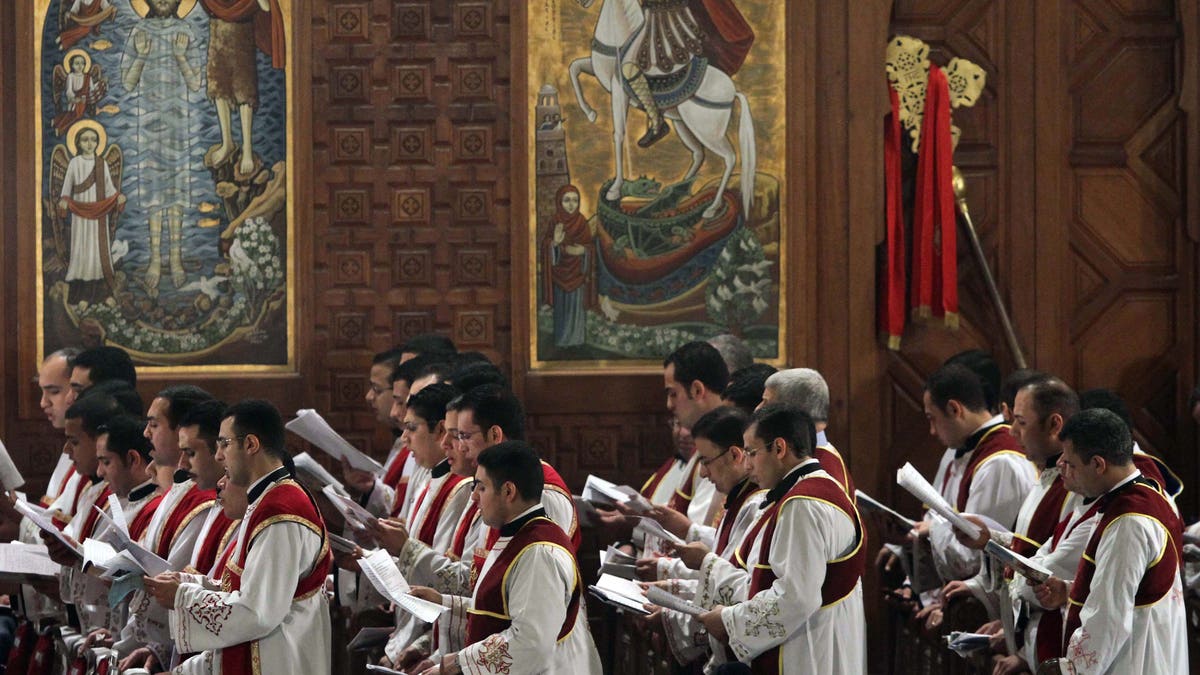
Jan. 6, 2012: A choir sings during Christmas Eve mass at the Coptic Cathedral in Cairo, Egypt. Egypt's Christians celebrated Saturday their first Christmas after the ouster of President Hosni Mubarak, amid tight security and a display of national unity to allay fears of the growing power of Islamists.
CAIRO -- Egypt's Christians celebrated Saturday their first Christmas after the ouster of President Hosni Mubarak, amid tight security and a display of national unity to allay fears of the growing power of Islamists.
The Coptic Orthodox celebration follows an escalation in violence against the minority, an estimated 10 percent of Egypt's 85 million people, over the past year.
Many Christians blamed a series of street clashes, assaults on churches, and other attacks on radical Islamists who have become increasingly bold after Mubarak's downfall.
Celebrations of Orthodox Christmas began with a late night Friday Mass at Cairo's main cathedral, which was attended by prominent figures from across Egypt's political spectrum. They included leaders of Muslim Brotherhood, an Islamist group whose associated political party has won nearly half the seats in parliament.
Members of the ruling military council that took power after Mubarak's Feb. 11 ouster also attended, including chief of staff Lt. Gen. Sami Anan, as well as the visiting top U.S. diplomat for the Middle East, Jeffrey Feltman.
Coptic Pope Shenouda III commended their presence and appealed for national unity for "the sake of Egypt."
"For the first time in the history of the cathedral, it is packed with all types of Islamist leaders in Egypt," the 88-year old pope said. "They all agree ... on the stability of this country and in loving it, and working for it and to work with the Copts as one hand for the sake of Egypt."
A series of attacks on churches earlier this year sent thousands of Coptic protesters into the streets, complaining that no culprits were brought to justice. In a dramatic turn, the latest of these protests in October was violently quelled by the country's military rulers, leaving 27 people dead and sparking further outrage.
Some expressed dismay that the church should welcome military leaders, even though justice has yet to be meted against those responsible for the killing of Coptic protesters.
During the mass at the cathedral, the presence of top military officers angered some in the congregation, who briefly chanted "Down with military rule" before being silenced by others.
The political gains of Islamist groups who have dominated the first post-Mubarak parliamentary elections have also made many nervous.
Some Christians are also taking advantage of the more open political atmosphere to assertively push demands for equal status with Muslims.
Copts have long complained of discrimination by the state and prejudice from the Muslim majority. Christians are rarely appointed to top security and government posts, and their beliefs are often savaged by radical Muslim clerics.
Absent from the Christmas celebrations were leaders of the more radical Salafi Al-Nour party, the second largest bloc in parliament. Many fear it will seek to push its ultraconservative interpretation of Islam.
Party spokesman Youssri Hamad said Islamic teachings contradict the Christian celebration of Jesus' birth, and that while his party respects Christian beliefs, its members cannot attend Christmas ceremonies or send Christmas greetings.
"This is not a party matter. This is an order from God," he said. He said his party did offer volunteers to protect the churches during the celebrations.
The Brotherhood leaders had left the cathedral before Mass began.
Heavy security had ringed churches around Egypt, with police and army troops manning streets leading to the churches. Volunteers from youth groups had also offered to provide security.
An attack on a church in Alexandria on New Year's Eve 2011 left 21 people dead and shook the community. The culprits for the attack are still not known, further fueling the outrage of Copts.
The show of national unity at the mass follows efforts since the October deaths by both Egyptian political parties and the church leadership to calm religious tensions.
But many Christians are left cold by military officers and opposition politicians who may be eager to be photographed next to a cleric, but unwilling to address Coptic grievances.
At the Cathedral, the pope made no mention of the uprising, only referring to the "tough transition" Egypt was going through. But at an evangelical church near Tahrir square, the epicenter of protests against both Mubarak and the military, activists and protesters attended Friday a service where the pastor commemorated the "sorrow and the sacrifice" of Egypt's revolutionaries.
A prominent activist, Ahmed Harara, who lost both his eyes during the uprising against Mubarak and in protests against the military was given a standing ovation. Feltman also attended the service.
In the southern province of Assiut, security officials said six masked assailants kidnapped three Coptic Christians early Saturday as they celebrated Christmas in a friend's house in a small village of Kambuha.
The officials said the abduction is not believed to be religious driven, and abductors have asked for a hefty ransom, $250,000, from the families of the kidnapped, who come from well-off families. One of the kidnapped is a student in the air force academy, said the officials speaking on condition of anonymity because they are not authorized to speak to the media.
